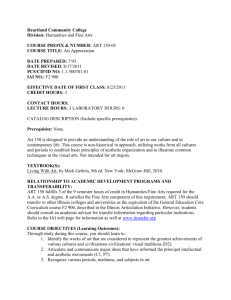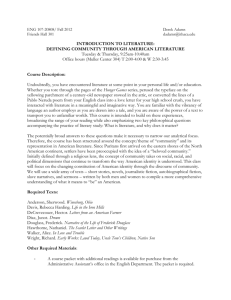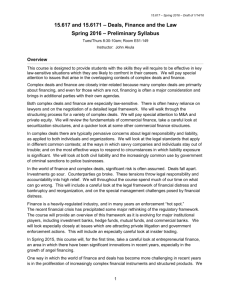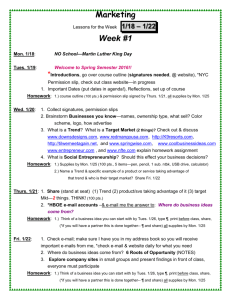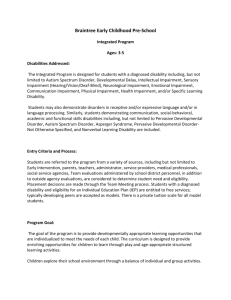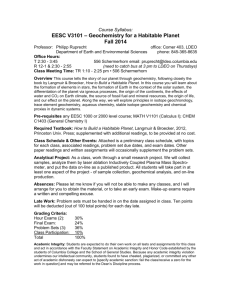008:085:001 Topics in British Culture and Identity
advertisement
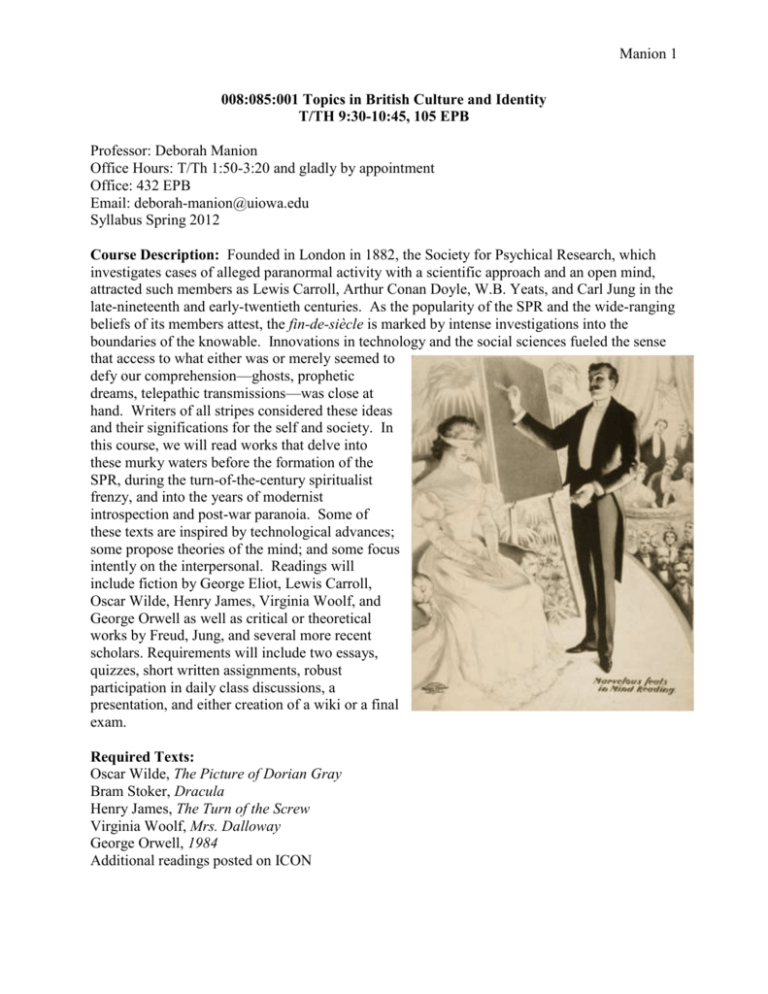
Manion 1 008:085:001 Topics in British Culture and Identity T/TH 9:30-10:45, 105 EPB Professor: Deborah Manion Office Hours: T/Th 1:50-3:20 and gladly by appointment Office: 432 EPB Email: deborah-manion@uiowa.edu Syllabus Spring 2012 Course Description: Founded in London in 1882, the Society for Psychical Research, which investigates cases of alleged paranormal activity with a scientific approach and an open mind, attracted such members as Lewis Carroll, Arthur Conan Doyle, W.B. Yeats, and Carl Jung in the late-nineteenth and early-twentieth centuries. As the popularity of the SPR and the wide-ranging beliefs of its members attest, the fin-de-siècle is marked by intense investigations into the boundaries of the knowable. Innovations in technology and the social sciences fueled the sense that access to what either was or merely seemed to defy our comprehension—ghosts, prophetic dreams, telepathic transmissions—was close at hand. Writers of all stripes considered these ideas and their significations for the self and society. In this course, we will read works that delve into these murky waters before the formation of the SPR, during the turn-of-the-century spiritualist frenzy, and into the years of modernist introspection and post-war paranoia. Some of these texts are inspired by technological advances; some propose theories of the mind; and some focus intently on the interpersonal. Readings will include fiction by George Eliot, Lewis Carroll, Oscar Wilde, Henry James, Virginia Woolf, and George Orwell as well as critical or theoretical works by Freud, Jung, and several more recent scholars. Requirements will include two essays, quizzes, short written assignments, robust participation in daily class discussions, a presentation, and either creation of a wiki or a final exam. Required Texts: Oscar Wilde, The Picture of Dorian Gray Bram Stoker, Dracula Henry James, The Turn of the Screw Virginia Woolf, Mrs. Dalloway George Orwell, 1984 Additional readings posted on ICON Manion 2 Grading Policy: The University of Iowa uses the A-F grading system. To receive an A or A- in the course, you must consistently present outstanding work for all assignments and discussions. A B+, B, or B- is earned by presenting a mix of excellent and satisfactory work. A grade of C+, C, or C- reflects work and participation that is meeting requirements. The D range is reserved for students whose work is poor and meeting the bare minimum of requirements, and an F represents a failure to meet course requirements. Requirements: Paper 1, 3-4 pages Paper 2, 5-6 pages Participation/Quizzes Response papers Wiki -rough draft presentation, 10% -final presentation, 10% -self-reflection write-up, 5% 20% 25% 15% 15% 25% Attendance Policy: Attendance is expected and will reflect in your final grade as part of the class participation assessment. Excessive absences (more than 4) will indicate a lack of participation, resulting in a failing participation grade (15% of final grade). The CLAS identifies the rare circumstances under which absences are excused, and these cases must be appropriately documented to receive class credit. If you need to miss a class for such a reason, please speak to me beforehand so that we may arrange assignments accordingly. Participation and Professionalism: Great participation involves speaking often in class but without dominating discussion; sharing short assignments, discussion questions, and informal commentaries; and having an active role in group activities. Professionalism refers to showing respect for others’ ideas and opinions in the classroom. This includes having your cell phones turned off. Participation and professionalism make up a significant percentage of your final grade for two simple reasons: this is a discussion course, and you should be rewarded for your daily contributions; and this is a course where sensitive issues may come up, and we all need to treat our colleagues with respect. Response papers are two-page assignments that you are responsible for throughout the semester. You must devise a question that requires analysis for you to arrive at an answer, and you must explain that answer using evidence from the text. The papers must explicitly address the reading for the assigned day. You are graded on the quality of your question as much as the quality of your answer. We will use these papers to initiate classroom discussions, so be prepared to share your questions and answers with the class. Response papers will NOT be accepted late or if they fail to address the day’s reading. Papers 1 & 2: Each of these papers must be submitted in hard copy AND electronically through our ICON website. Neither will require additional research but should rather showcase your own engaging argumentation that relies on your close-reading, analytical, and expository skills. The second paper will be slightly longer than the first and may engage with scholarly articles in support of your thesis if you wish but, if so, should be discussed with me first. Manion 3 Late Paper Policy: Short assignments (such as discussion questions and response papers) will not be accepted late, and quizzes cannot be made up. If circumstances make it impossible for you to hand in a formal essay on time, please speak to me prior to the due date for that assignment. Otherwise, each day past due will result in a ½ grade penalty for that paper. Late papers will not be accepted more than two class sessions past due. The Wiki: This is a major and exciting aspect of our course. We will work on these sites all semester in groups, with each group assigned to a different text. You will have opportunities to identify your own areas of expertise, provide self- and group-assessments, present your wiki to the class at different stages, and interact directly with ITS staff and equipment to get all the technical help you need. The class wiki will be available to the general public and should prove to be a valuable resource for those web-surfers interested in our texts and our course. The umbrella site is already quite popular and well-regarded, so you have a great opportunity here to learn valuable and versatile skills while engaging with Victorian literature and culture in lively and unconventional ways. I welcome frequent questions and discussions about the process and progress of these sites throughout the semester. I assure you we will spend ample time helping each other make our class “Vicwik” as impressive—or more so—than the ones already available. Further information, including a grading rubric, will follow shortly. Students with Special Needs: I need to hear from anyone who has a disability that may require some modification of seating, testing or other class requirements so that appropriate arrangements may be made. Please contact me during my office hours. Student Resources: If you would like additional help with your writing skills, please speak with me. You can also visit the Writing Center in 110 EPB to schedule an appointment with them. E-mail tutoring is available through the Writing Center’s website, http://www.uiowa.edu/~writingc, where you will also find more information about Writing Center services. Schedule of Assignments (Subject to change with written notice): Tues, 1/17: Introductions, syllabus review Thurs, 1/19: George Eliot, “The Lifted Veil” Tues, 1/24: Sheridan Le Fanu, “An Account of Some Strange Disturbances in Aungier Street”; “Green Tea”; Hand in requests for your wiki groups Thurs, 1/26: Wiki training day Tues, 1/31: Robert Louis Stevenson, “The Strange Case of Dr. Jekyll and Mr. Hyde” Thurs, 2/2: Oscar Wilde, The Picture of Dorian Gray, Preface-chap 5 Tues, 2/7: Dorian Gray, chap 6-14 Thurs, 2/9: Dorian Gray, chap 15-end; Response paper one due Tues, 2/14: Selections on Psychology, Psychical Research, and Sexology 1892-1897 Thurs, 2/16: Pamela Thurschwell, “The Society for Psychical Research’s Experiments in Intimacy” Manion 4 Tues, 2/21: Bram Stoker, Dracula, chaps 1-8 Thurs, 2/23: Dracula, chaps 9-12; Response paper two due Tues, 2/28: Dracula, chaps 13-19 Thurs, 3/1: Dracula, chap 20-24 Tues, 3/6: Dracula, chaps 25-end; wiki presentation on Dracula Thurs, 3/8: First essay due on ICON and in class; wiki presentation on Dorian Gray Tues, 3/13 and Thurs, 3/15: SPRING BREAK Tues, 3/20: Henry James, The Turn of the Screw through chap 14 Thurs, 3/22: The Turn of the Screw to end; wiki presentation on James Tues, 3/27: Rudyard Kipling, “The Finest Story in the World,” “Wireless”; wiki presentation on Kipling Thurs, 3/29: Sigmund Freud, “The Uncanny” Tues, 4/3: Freud, “Psychoananlysis and Telepathy,” “Dreams and Telepathy,” “The Occult Meaning of Dreams” and perhaps other selections; wiki presentation on Freud selections Thurs, 4/5: Virginia Woolf, Mrs. Dalloway, 1-69 Tues, 4/10: Mrs. Dalloway, 69-164; Response paper three due Thurs, 4/12: Mrs. Dalloway, 164-end; wiki presentation on Mrs. Dalloway Tues, 4/17: George Orwell, 1984, 1-104 Thurs, 4/19: 1984, 105-167 Tues, 4/24: Advanced Wiki Q & A session Thurs, 4/26: 1984, 167-260 Tues, 5/1: 1984, finish; Wiki presentation on 1984 Thurs, 5/3: Final essay due on ICON and in class; Course wrap-up FINAL EXAM: TBA: Wiki Final Presentations plus self-reflective essay due Wiki Groups: Oscar Wilde, The Picture of Dorian Gray Bram Stoker, Dracula Henry James, The Turn of the Screw Rudyard Kipling, “Wireless,” “The Finest Story in the World” Sigmund Freud, “The Uncanny,” selections on telepathy Virginia Woolf, Mrs. Dalloway George Orwell, 1984 Manion 5 The College of Liberal Arts and Sciences Administrative Home The College of Liberal Arts and Sciences is the administrative home of this course and governs matters such as the add/drop deadlines, the second-grade-only option, and other related issues. Different colleges may have different policies. Questions may be addressed to 120 Schaeffer Hall, or see the CLAS Academic Policies Handbook. Electronic Communication University policy specifies that students are responsible for all official correspondences sent to their University of Iowa e-mail address (@uiowa.edu). Faculty and students should use this account for correspondences. (Operations Manual, III.15.2. Scroll down to k.11.) Accommodations for Disabilities A student seeking academic accommodations should first register with Student Disability Services and then meet privately with the course instructor to make particular arrangements. See www.uiowa.edu/~sds/ for more information. Academic Honesty All CLAS students have, in essence, agreed to the College's Code of Academic Honesty: "I pledge to do my own academic work and to excel to the best of my abilities, upholding the IOWA Challenge. I promise not to lie about my academic work, to cheat, or to steal the words or ideas of others; nor will I help fellow students to violate the Code of Academic Honesty." Any student committing academic misconduct is reported to the College and placed on disciplinary probation or may be suspended or expelled (CLAS Academic Policies Handbook). CLAS Final Examination Policies The date and time of every final examination is announced during the fifth week of the semester; each CLAS student will receive an email from the Registrar stating the dates and times of the student's final exams. Final exams are offered only during the official final examination period. No exams of any kind are allowed during the last week of classes. All students should plan on being at the UI through the final examination period. Making a Suggestion or a Complaint Students with a suggestion or complaint should first visit with the instructor (and the course supervisor), and then with Barbara Eckstein, the English department’s Director of Undergraduate Studies. Complaints must be made within six months of the incident (CLAS Academic Policies Handbook). Understanding Sexual Harassment Sexual harassment subverts the mission of the University and threatens the well-being of students, faculty, and staff. All members of the UI community have a responsibility to uphold this mission and to contribute to a safe environment that enhances learning. Incidents of sexual harassment should be reported immediately. See the UI Comprehensive Guide on Sexual Harassment for assistance, definitions, and the full University policy. Reacting Safely to Severe Weather In severe weather, class members should seek appropriate shelter immediately, leaving the classroom if necessary. The class will continue if possible when the event is over. For more Manion 6 information on Hawk Alert and the siren warning system, visit the Public Safety web site. Student Classroom Behavior The ability to learn is lessened when students engage in inappropriate classroom behavior, distracting others; such behaviors are a violation of the Code of Student Life. When disruptive activity occurs, a University instructor has the authority to determine classroom seating patterns and to request that a student exit the classroom, laboratory, or other area used for instruction immediately for the remainder of the period. One-day suspensions are reported to appropriate departmental, collegiate, and Student Services personnel (Office of the Vice President for Student Services and Dean of Students).


